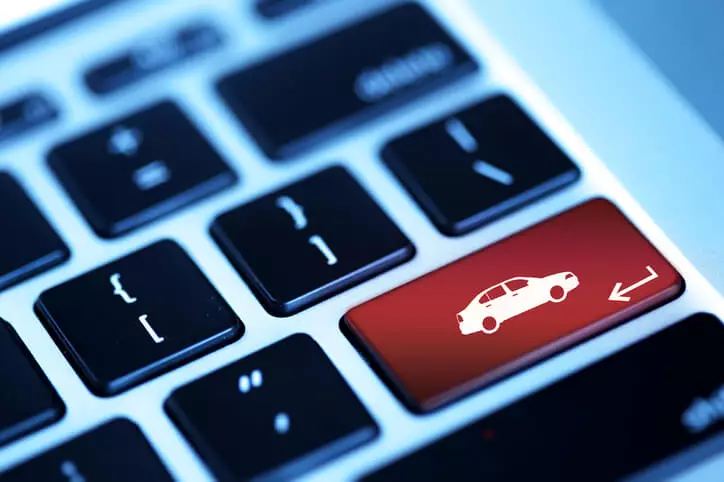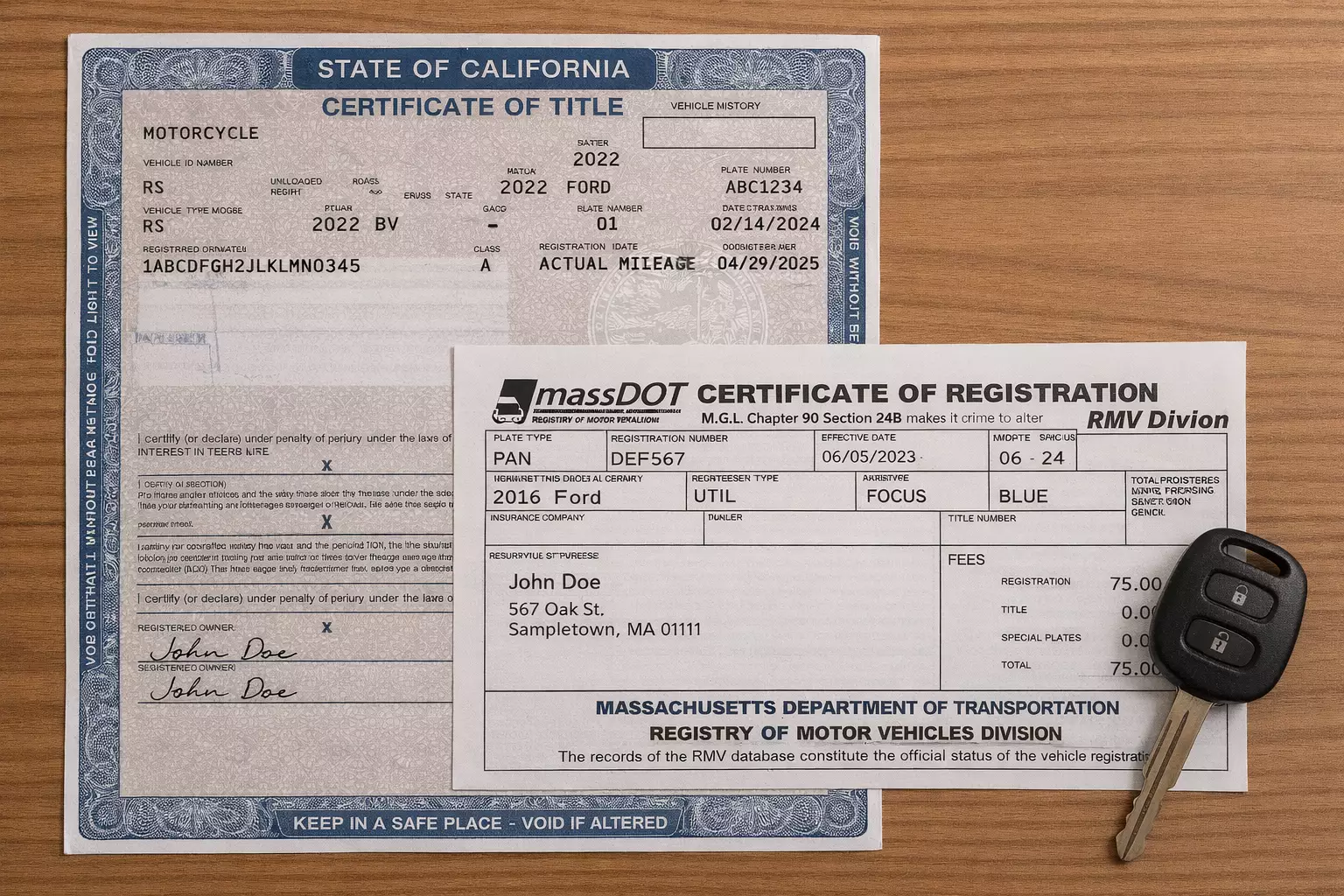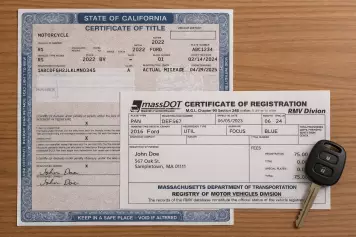
To drive a car legally on the highways and roadways in the U.S., you must register it with the state and town you live in. Some other important things that go along with registration are license plates, insurance, and inspections. Each state has its own laws about how to register your car and take care of these other requirements. It is illegal to drive a car on highways and public roadways without a valid registration. If you don’t renew your car registration for a few months after the date of expiration, you might lose the ability to renew it, and you might have to re-register it as new again.
How To Register A Car?
When you purchase a new car, the dealership may be able to register it for you as part of their vehicle services. In some states, however, you will have to do it yourself. When you buy a used car, you must register it yourself. Following the purchase, there's a specified window within which you must not only register the vehicle but also complete a vehicle inspection to ensure it meets safety and emissions standards.
Before you can register your car, you must have valid auto insurance that meets your state's minimum requirements.
Your local town office, tax collector’s office, or DMV will give you a set of license plates. You will also get a sticker (sometimes called a decal) to put on the plates indicating that you are registered. That is for law enforcement, so they can see it when they run your plate number if they stop you. You will also receive a registration card that you must keep in your vehicle at all times.
Each time you renew your car registration, you will receive a new card with a new expiration date on it and a new set of stickers for your plates.
At the time of registration, you will also need to pay some fees. The state charges a fee, as does the local town you live in. If you get plates at the same time, you will be charged for those as well.
What is Vehicle Registration Renewal?
Vehicle registration renewal is the mandatory process that vehicle owners must undergo periodically to keep their vehicle's legal registration status up to date, ensuring the vehicle remains authorized for use on public roads. This process involves submitting required documents and paying a fee to the relevant state or local government agency. Failure to renew a car’s registration within the prescribed time frame can result in fines, penalties, or even the impoundment of the vehicle. Each state or jurisdiction has its own specific procedures, standards, and deadlines for vehicle registration renewal, which may include online, mail, or in-person submissions. It's crucial for vehicle owners to be aware of and comply with these regulations to avoid legal issues and continue driving their vehicles legally.
Why Do You Need to Renew Your Registration
Car registration renewal is necessary to demonstrate that the vehicle complies with safety and emissions regulations, has completed a vehicle inspection, and is insured to the minimum level necessary. Vehicle registration renewal also ensures that the state has current, correct information on who owns and where all registered vehicles are located.

How to Renew Car Registration
Each state has its own options for renewing car registration. Typically, you will have to register the car initially in person at your DMV or transportation office. Some states like New Hampshire allow you to register at your local town offices. After that, you can renew your car registration in a variety of ways.
The process generally involves the following steps:
Receive Renewal Notice: A few weeks before their registration is due to expire, car owners will get a renewal notification from the majority of states. The procedure for renewing the vehicle registration, the cost of the renewal, and any additional requirements or required documentation are normally included in this notification.
Check Vehicle Information: Vehicle owners should verify that their vehicle's information is valid and current before the vehicle registration renewal. This might entail checking the insurance policy, license plate number, and vehicle identification number (VIN).
Pay Renewal Fee: Owners of vehicles will have to pay a renewal charge to renew the car registration. The cost varies from state to state and may depend on the kind of vehicle, how old the car is, and other elements.
Pass Vehicle Inspection: Before they may be registered, automobiles may need to undergo safety and emissions inspections in several states. To find out whether an inspection is required and where it may be done, vehicle owners can research the car inspection regulations in their state.
Provide Required Documents: Vehicle owners may be asked to submit additional paperwork while renewing their vehicle’s registration, such as a smog certificate or evidence of insurance, in addition to the renewal money and inspection certificate.
Receive New Registration Materials: The vehicle owner will get fresh registration documents, such as a new registration card and a new registration sticker, once the vehicle registration renewal procedure is finished.
What Do You Need to Renew Car Registration
The specific documents required for car registration renewal can vary by state or country, but generally, the following are commonly needed:
- Proof of insurance (required each year by most states).
- Emissions test.
- Sales tax payment.
- Passed inspection receipt.
- Your current registration.
- VIN (vehicle identification number).
- License plate number.
- Driver’s license number.
- Photo ID
It's important to check with your local DMV or equivalent vehicle registration authority for the specific documents required in your area, as the requirements can change and may include additional or fewer documents than those listed above.
Tips for a Smooth Vehicle Registration Renewal Proces
While the vehicle registration renewal process may seem straightforward, there are a few tips that vehicle owners can follow to ensure a smooth and hassle-free experience. Here are some tips to keep in mind when renewing your vehicle registration:
- Plan Ahead: To avoid any last-minute complications, be sure to mark your calendar with the renewal deadline for your car registration and begin the procedure early. This will also allow you time to compile the essential paperwork and finish up any necessary inspections.
- Verify Your Information: Verify that all of the details about your car are correct and up to date before renewing your car’s registration. This information consists of your name, address, vehicle identification number (VIN), and license plate number.
- Keep Your Records Organized: Maintain a safe and convenient area where you can immediately access all of your car registration documents. This contains your vehicle's registration card, license plate tags, and any further paperwork.
- Renew Online: Many states now offer the option to renew vehicle registration online, which can save time and eliminate the need to visit a DMV office in person. Make sure to check your state's online renewal process and requirements.
- Complete Required Inspections: Before a car may be registered in several states, it must undergo safety and emissions checks. Make sure you complete all mandatory inspections before attempting to renew your vehicle’s registration.
- Be Prepared to Pay: A renewal cost, which varies by state and kind of vehicle, is normally needed to renew your car registration. When you renew your registration, be sure you have the money available to pay the charge.
- Don't Wait Until the Last Minute: Renewing your car registration on or just before the deadline might result in longer lines at DMV offices and the chance of missing the deadline entirely.
- Keep Your New Registration Materials in Your Vehicle: As soon as you get your new registration paperwork, be sure to have them with you at all times in your car. Your registration card, license plate tags, and registration sticker fall within this category.
- Stay Informed: Be informed about any modifications or changes to your state's rules and regulations regarding automobile registration. By doing this, you'll be able to anticipate any challenges or difficulties that could come up throughout the renewal process.
By following these tips for a smooth vehicle registration renewal process, vehicle owners can save time, avoid stress, and ensure that their vehicles are properly registered and up-to-date.
What Happens If You Renew Your Registration Late?
Late fees and the suspension of driving privileges are among the consequences of failing to renew a vehicle's registration on time. When a car owner's registration has been suspended, there are occasionally additional costs or penalties that must be paid. Vehicle owners must renew their car registration before the deadline and maintain current registration information at all times to avoid these fines.
Keep Your Vehicle's Registration Active
The process of renewing a vehicle's registration is crucial for ensuring that a vehicle's legal registration and ability to be driven on public roads are maintained. Vehicle owners may prevent fines and penalties and ensure that their cars are in conformity with all relevant safety and emissions regulations by being aware of the requirements and processes for vehicle registration renewal. Contact the Department of Motor Vehicles in your state or another appropriate entity if you require assistance or have concerns about how to renew your car registration.









![Best Sites to Check a Car’s History [2025 Review]](https://media.infopay.net/thumbnails/K8lMeG2QLjE46LPqZlmoi6SunKKdT5qvlaRZk6e1.webp)










![Best Sites to Check a Car’s History [2025 Review]](https://media.infopay.net/thumbnails/K8lMeG2QLjE46LPqZlmoi6SunKKdT5qvlaRZk6e1-w356.webp)